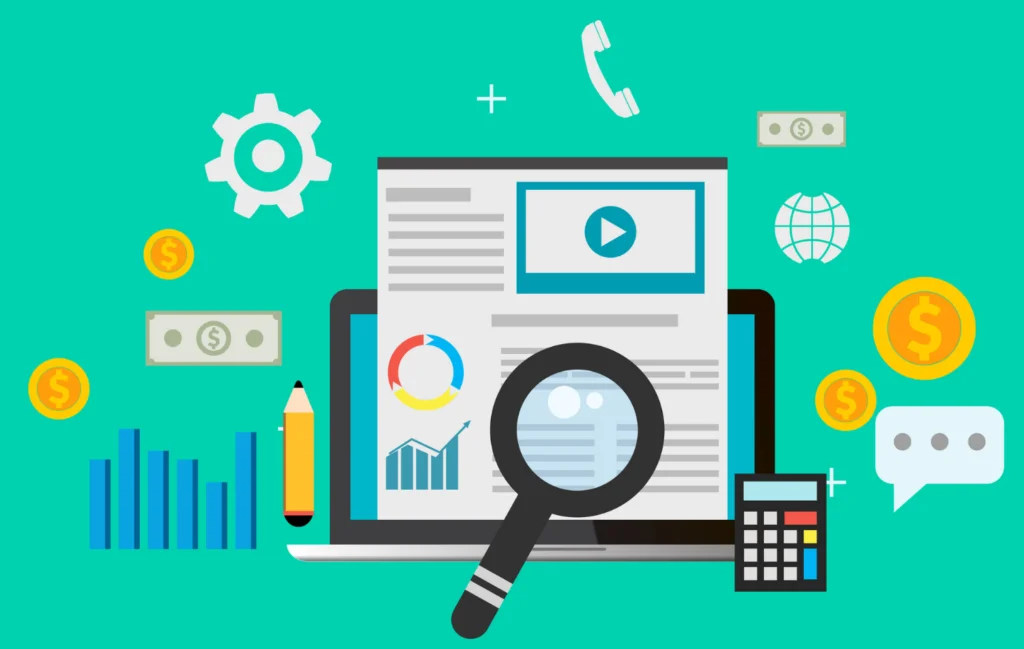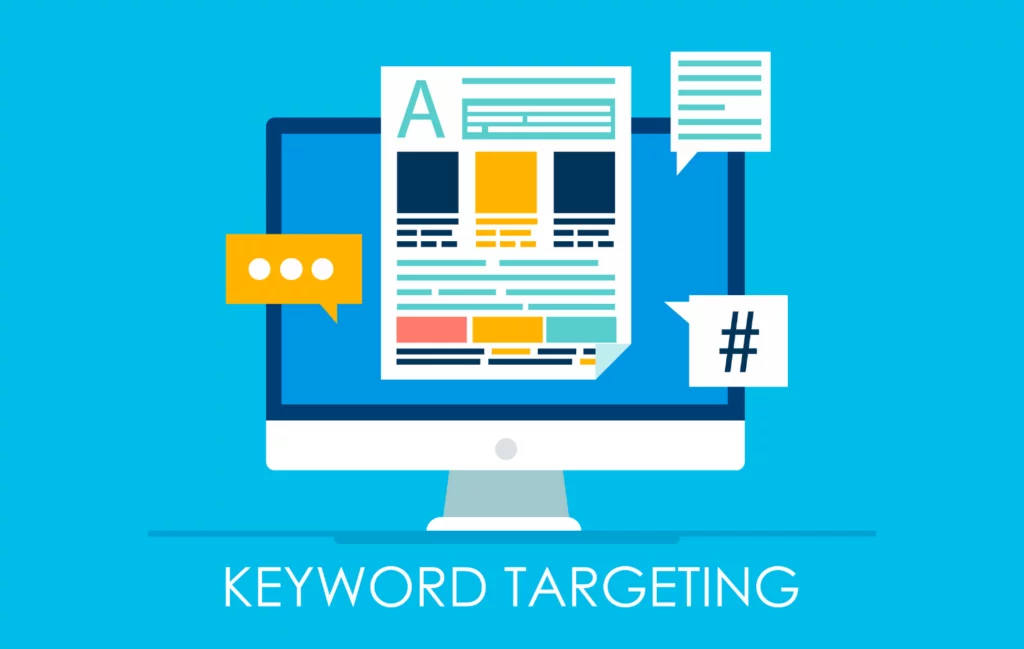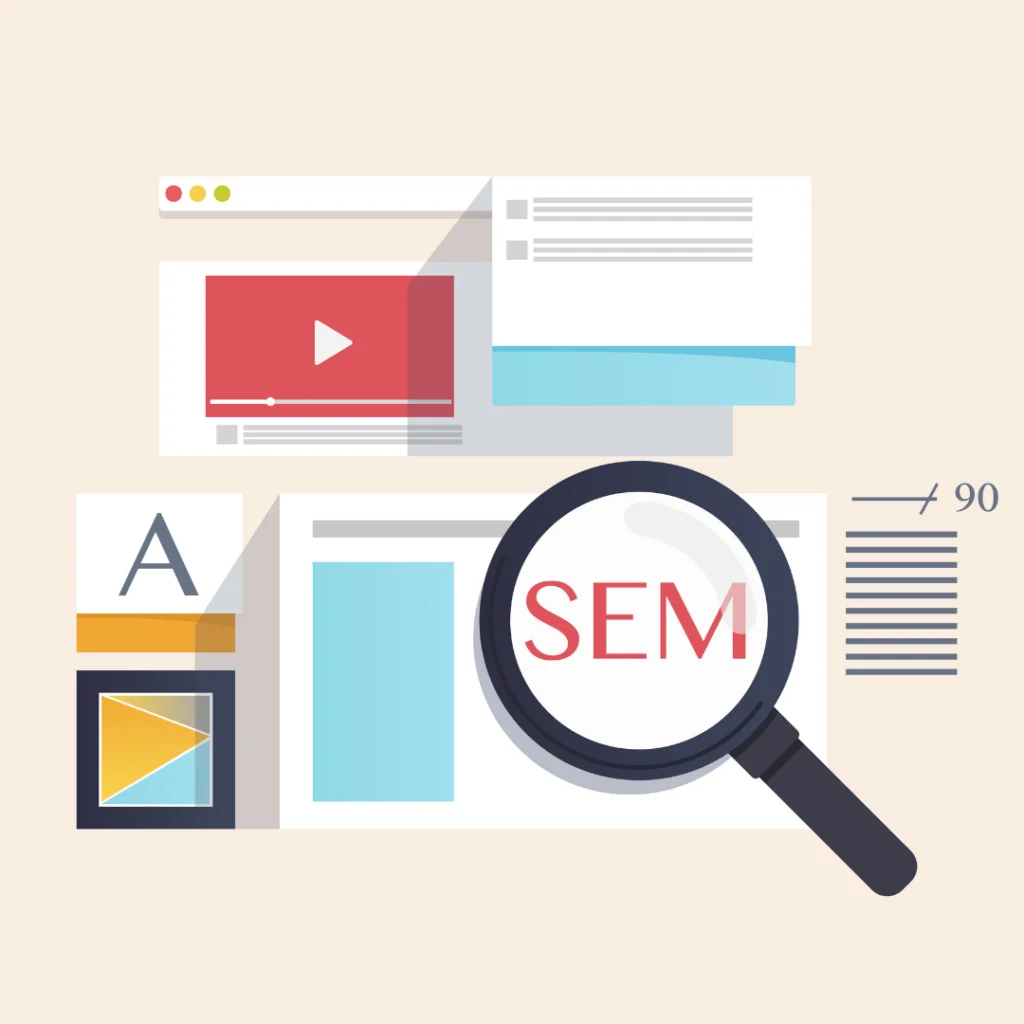First of All, What is SEM?
Search Engine Marketing (SEM) is leveraging paid strategies to increase your business’s search visibility. With SEM, brands pay for advertisements to appear as search results on search engine results pages, otherwise known as SERPs. Search engine results pages utilize targeted keywords so that when a user searches them, they see an ad from the brand. SEM and SEO are similar, however the main difference is that SEO is focused on optimizing a website to gain more traffic from organic search results, and SEM focuses on gaining traffic and visibility from both organic and paid search.
How Exactly Can SEM Help You
SEM provides benefits to your business by increasing your online presence, enhancing your brand awareness and visibility, and leading to more online leads, thus generating sales. SEM can make the process of implementing and managing advertisements more easily and quickly. Another added benefit of SEM is that businesses will only pay once an action is applied onto an advertisement.
Consider These Factors to Improve Your SEM Marketing Strategy

To successfully lead a search engine marketing strategy, the following tactics and tools are helpful.
Aim and Purpose: It is important to understand the aim and purpose of the campaign. By doing so, you will set up goals and establish milestones that point forward. This will result in helping your team analyze metrics better and ensure your campaign will perform at the level you desire.
Audience, Scope, and Targeting: Identifying specific targeting parameters, geographic regions/locations, time, conversions, and search terms will help with your ad’s showing capacity to the right people at the right time.
Keywords: Targeting the right keywords aids in the refining process. To be strategic, your business would not just choose a set of keywords and forget them later on. Instead, monitoring their performance removing keywords that aren’t generating leads will need to be reevaluated to ensure a successful SEM strategy.
Search Query Intent: Information, navigational, and transactional types. You need to understand the intent behind the keywords chosen for your campaigns; knowing this will help you build better keyword groups for specific ad campaigns.
Landing Pages: Creating a proper landing page will help your audience find what they’re looking for once they click on an ad.
Re-Marketing and Display: Both strategies are a great way to keep your brand or offer in front of a customer close to converting and bringing them back to the site so they can complete their purchase.
Testing: Conducting testing on advertisement extensions, product feeds, long-tail keywords in ad copies, ad copy trends, and ad creatives will help boost landing page performance.
Continuous Optimization: To boost your business’s SEM, optimizing each aspect of every campaign will help maximize performance. This would include refining keywords, targeting parameters to landing page performance, quality scores, and everything in between. More importantly, ensure you are keeping up with available census data and marketing insights so that it aligns with your SEO marketing!
Why Keywords are an Important Part of Any SEM Strategy

Keywords help identify and determine what your company is known for. By using the right keywords, your team will understand what content to market in the paid search marketing realm. More importantly, you shouldn’t bid on just any and every keyword out there, even if they are relevant. Keyword research is the blueprint for your online marketing efforts, hence driving every decision you will make. Intent of keywords matter for paid search and you don’t want to overspend.
For example, let’s talk dealerships. You should avoid wasting your entire budget on a keyword such as “Ford F-150” because it is way too broad. The intent is more informational than commercial or transactional, and the search volume of this keyword could result in you splurging through your entire budget. Instead, focusing more on phrases such as “Ford F-150 for Sale” or “F-150 Near Me” are more specific searches and showcase a commercial, transactional intent where the user is looking to convert or purchase.
Don’t Forget About Your Google Ads Bidding Strategies

Google Ads provide a cost-effective way for businesses of all sizes to reach a virtually unlimited, targeted audience. These advertisements are extremely flexible, and you can start, stop, pause, or adjust your bids at any time. When you set up a Google Ads campaign, you will notify Google how much you’re willing to pay for your ad to be shown. Otherwise known as your bid, Google’s automated bidding strategies adjusts bids for you based on the ad’s likelihood of getting a “click” or conversion. With manual bidding, you notify Google of the maximum amount you’re willing to pay per click (PPC) on your ad and can then make adjustments based on performance
We Know There’s A lot to Consider When it comes to SEM
At Reach Marketing, we understand the importance a proper SEM strategy brings to the table. If you plan to compete in today’s competitive landscape, you can’t overlook the value of search engine marketing. It’s just one piece of the marketing pie, and a significant slice at that!
We have a team of SEM experts who are available to improve and optimize your business’s SEM marketing strategies.
Contact us here to schedule a free consultation.
By partnering with your business, we will make sure that you’re bidding and appropriating the correct keywords, creating the best campaigns, building the most effective landing pages, and combining marketing strategies to obtain the best long-term results.






